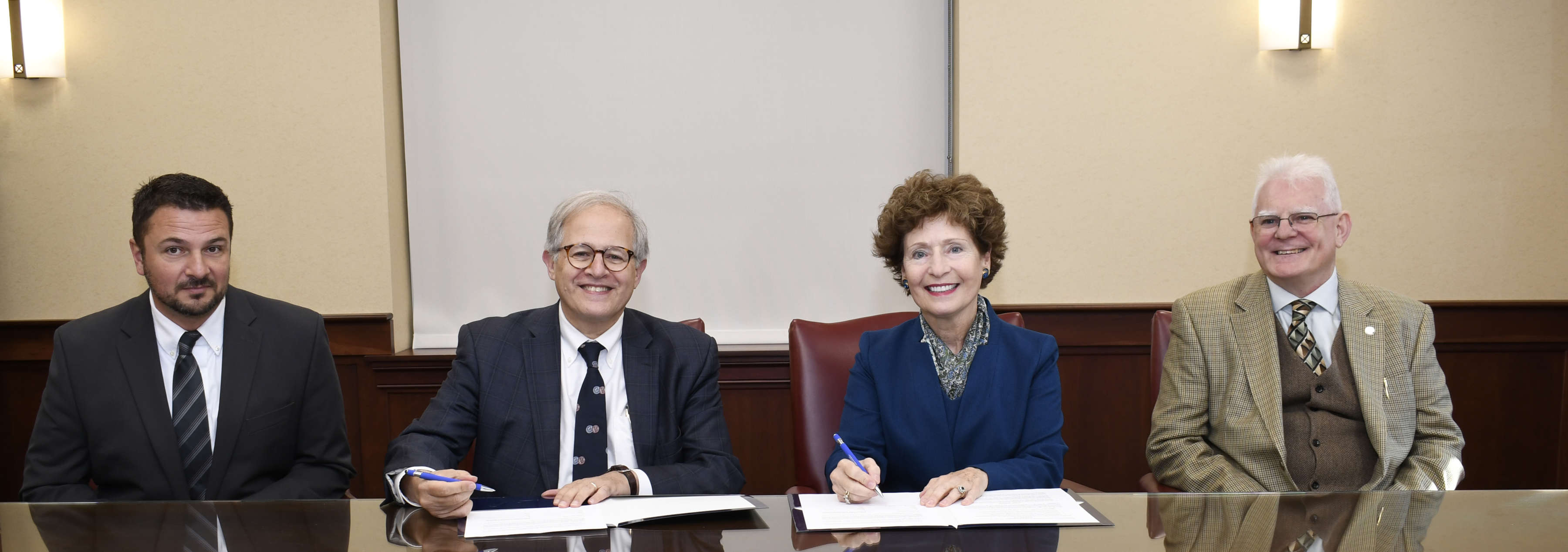ISSUED: 6 December 2022
MEDIA CONTACT: Dana Costa
SHEPHERDSTOWN, WV — Science students at Shepherd University will have the opportunity to gain practical research experience and exposure to state-of-the-art technology thanks to a new memorandum of understanding (MOU) between the University and the Frederick National Laboratory for Cancer Research (FNL) in Frederick, Maryland.

Pictured (l. to r.) are Vladimir Popov, Ph.D., Frederick National Lab chief innovation officer; Ethan Dmitrovsky, M.D., Frederick National Lab director; Dr. Mary J.C. Hendrix, Shepherd president; and Dr. Robert Warburton, Shepherd College of Science, Technology, Engineering, and Mathematics dean.
The agreement states that the FNL and Shepherd have a shared interest in furthering biomedical research, and both anticipate benefits from the exchange of training, research, and expertise.
The University and FNL plan to work together to provide student training in STEM fields focused on biomedical research, including data science, bioinformatics, imaging, and cancer biology. Both FNL and University plan to host mutual visits, seminars, and exchanges of technical expertise for workforce development and community involvement.
“This MOU provides a potential venue for students to participate in research projects that utilize the most modern equipment and techniques,” said Dr. Robert Warburton, dean of Shepherd’s College of Science, Technology, Engineering, and Mathematics. “Students could potentially prepare for and continue aspects of their research here at Shepherd with faculty mentors.”
“As a scientific organization, we are eager to connect with and inspire the next generation of STEM professionals,” said Ethan Dmitrovsky, M.D., FNL director. “We are proud members of the Frederick community and look forward to engaging with Shepherd University faculty to enhance both Shepherd and FNL.”
Warburton said the collaboration with FNL will benefit Shepherd’s faculty by giving them access to facilities and expertise through collaboration on various projects with FNL’s research scientists.
“The availability of such an extraordinary group of staff and scientists at FNL within close proximity could allow many of them to become regularly invited speakers for seminars and symposia, guest lecturers in our classes, and to become involved as external reviewers for student capstone projects and senior thesis work,” he said.
About Shepherd University
Established in 1871, Shepherd is a public university grounded in the liberal arts and sciences. It prepares students for lifelong learning and success in their chosen pursuits and serves as a hub for academic, cultural, and economic opportunities. Shepherd offers more than 100 different academic programs, fields 15 NCAA Division II athletic teams, and houses more than 100 clubs and organizations, many with a strong emphasis on student community service. Shepherd is a military-friendly campus and proud partner in the U.S. Department of Veteran Affairs Yellow Ribbon Program. Shepherd is also the home to the Contemporary American Theater Festival, George Tyler Moore Center for the Study of the Civil War, Center for Regional Innovation, Bonnie and Bill Stubblefield Institute for Civil Political Communications, and Robert C. Byrd Center for Congressional History and Education.
About Frederick National Laboratory for Cancer Research
The Frederick National Laboratory for Cancer Research is a national laboratory and Federally Funded Research and Development Center dedicated to the application of biomedical science and technology to improve human health. Its scientists conduct basic, translational, and applied research, create new technologies, and collaborate with government, industry and academic colleagues. The Frederick National Laboratory supports the National Cancer Institute and other Institutes of the National Institutes of Health. As a government-owned, contractor-operated scientific enterprise, the Frederick National Laboratory efficiently addresses critical biomedical questions that no one else can readily do, and rapidly responds to emerging health threats.
— 30 —
